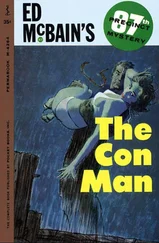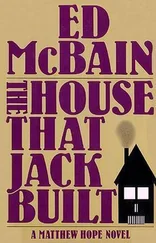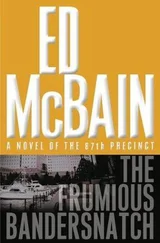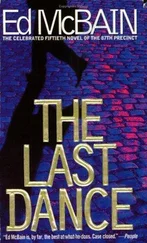Ed Mcbain - The Heckler
Здесь есть возможность читать онлайн «Ed Mcbain - The Heckler» весь текст электронной книги совершенно бесплатно (целиком полную версию без сокращений). В некоторых случаях можно слушать аудио, скачать через торрент в формате fb2 и присутствует краткое содержание. Жанр: Полицейский детектив, на английском языке. Описание произведения, (предисловие) а так же отзывы посетителей доступны на портале библиотеки ЛибКат.
- Название:The Heckler
- Автор:
- Жанр:
- Год:неизвестен
- ISBN:нет данных
- Рейтинг книги:4 / 5. Голосов: 1
-
Избранное:Добавить в избранное
- Отзывы:
-
Ваша оценка:
- 80
- 1
- 2
- 3
- 4
- 5
The Heckler: краткое содержание, описание и аннотация
Предлагаем к чтению аннотацию, описание, краткое содержание или предисловие (зависит от того, что написал сам автор книги «The Heckler»). Если вы не нашли необходимую информацию о книге — напишите в комментариях, мы постараемся отыскать её.
The Heckler — читать онлайн бесплатно полную книгу (весь текст) целиком
Ниже представлен текст книги, разбитый по страницам. Система сохранения места последней прочитанной страницы, позволяет с удобством читать онлайн бесплатно книгу «The Heckler», без необходимости каждый раз заново искать на чём Вы остановились. Поставьте закладку, и сможете в любой момент перейти на страницу, на которой закончили чтение.
Интервал:
Закладка:
The police emergency trucks with two-way radio numbered fifteen, and the emergency station wagons with two-way radio numbered ten, and all twenty-five of these were dispatched to the scenes of the fires and explosions which were disrupting traffic everywhere on the south side and which were causing all nine of the traffic precincts to throw extra men and equipment into the stricken area.
The north side of the precinct, the area between the new quarters of the Mercantile Trust Company and the waiting room of the Isola-Majesta ferry, was suddenly devoid of policemen.
Meyer Meyer and Bert Kling, cruising in an unmarked sedan, ready to prevent any crime which occurred against the harassed places of business on their list, received a sudden and urgent radio summons and were promptly off The Heckler Case. The radio dispatcher told them to proceed immediately to a subway station on Grady Road to investigate a bomb threat there.
By 4:30P.M ., six Civil Defense units were thrown into the melee, and the Police Commissioner made a hurried call to the Mayor in an attempt to summon the National Guard. The National Guard would eventually be called into action because what started as a simple plot to rob a bank would grow into a threat to the very city itself, a threat to equal the Chicago fire or the San Francisco earthquake, a threat which—when all was said and done—totaled billions of dollars in loss and almost razed to the ground one of the finest ports in the United States. But the wheels of bureaucracy grind exceedingly slow, and the National Guard units would not be called in until 5:40P.M ., by which time the Mercantile Trust Company’s vault would be empty, by which time invasion reports had caused panic beyond anything imagined by the deaf man, by which time the river front to the south was a blazing wall of flame, by which time everyone involved knew they were in the center of utter chaos.
In the meantime, it was only 4:30P.M ., and the deaf man had completed twenty-two of his calls. Smiling, listening to the sound of sirens outside, he dialed the twenty-third number.
MR. WESLEY GANNLEY,manager of the Mercantile Trust Company, paced the marbled floors of his new place of business, grinning at the efficiency of his employees, pleased as punch with the new building. The IBM machines were ticking away behind the counters. Music flowed from hidden wall speakers, and a mural at the far end of the building, washed with rain-dimmed light at the moment, depicted the strength of America and the wisdom of banking. The polished glass-and-steel door of the vault was open, and Gannley could see into it to the rows of safety deposit boxes and beyond that to the barred steel door, and he felt a great sense of security, he felt it was good to be alive.
Mr. Gannley took his gold pocket watch from the pocket of his vest and looked at the time.
4:35P.M .
In twenty-five minutes, they would close up shop for the day.
Tomorrow morning, May 1, everyone would return bright and early, and depositers would come through the bank’s marble entrance arch and step up to the shining new tellers’ windows, anxious to reap that three and a half per cent, and Mr. Gannley would watch from the open door of his manager’s office and begin counting the ways he would spend his Christmas bonus this year.
Yes, it was good to be alive.
He walked past Miss Finchley who was bending over a stack of canceled checks, and he was seized with an uncontrollable urge to pinch her on the buttocks.
He controlled the urge.
“How do you like the new building, Miss Finchley?” he asked.
Miss Finchley turned toward him. She was wearing a white silk blouse, and the top button had come unfastened and he could see the delicate lace of her lingerie showing where the cream-white flesh ended.
“It’s beautiful, Mr. Gannley,” she answered. “Simply beautiful. It’s a pleasure to work here.”
“Yes,” he said. “It certainly is.”
He stood staring at her for a moment, wondering whether or not he should ask her to join him for a cocktail after closing. No, he thought, that would be too forward. But perhaps a lift to the station. Perhaps that might not be misinterpreted.
“Yes, Mr. Gannley?” she said.
He decided against it. There was plenty of time for that. In a wonderful new building like this one, with IBM machines and music flowing from hidden speakers, and a bright, colorful mural decorating the far wall, and an impervious steel vault, there was plenty of time for everything.
Recklessly, he said, “You’d better button your blouse, Miss Finchley.”
Her hand fluttered up to the wayward button. “Oh, my,” she said. “I’m practically naked, aren’t I?” and she buttoned the blouse quickly without the faintest trace of a blush.
Plenty of time for everything, Wesley Gannley thought, smiling, plenty of time.
The tellers were beginning to wheel their mobile units into the vault. Every day at 4:45P.M ., the tellers performed this ritual. First they took the coin racks from the change machines on the counter and laced these racks into the top drawers of the units. The bottom drawers usually contained folding money. Today, both drawers and coin racks were empty because the bank had not done any business at its new location, and all the money had been transferred directly to the new vault. But nonetheless, it was 4:45P.M ., and so the units were wheeled into the vault and Mr. Gannley looked at his watch, went to his desk, and took the key which fit into the three clocks on the inside face of the vault door. The clocks were minuscule and were marked with numerals indicating hours. Mr. Gannley put his key into the first clock and set it for fifteen hours. He did the same to the other two clocks. He expected to be at work at 7:30A.M . tomorrow morning, and he would open the vault at 7:45A.M . It was now 4:45P.M .—ergo, fifteen hours. If he tried to open the vault door before that time, it would not budge, even if he correctly opened the two combination locks on the front face of the door.
Mr. Gannley put the key into his vest pocket and then heaved his shoulder against the heavy vault door. It was a little difficult to close because the carpeting on the floor was new and still thick and the door’s friction against it provided an unusual hindrance. But he managed to shove the door closed, and then he turned the wheel which clicked the tumblers into place, and then he spun the dials of the two combination locks. He knew the alarm was automatically set the moment that vault door slammed shut. He knew it would sound at the nearest police precinct should anyone tamper with the door. He knew that the combination locks could not be opened if the time mechanism was not tripped. He further knew that, should the alarm go off accidentally, he was to call the police immediately to tell them a robbery was not truly in progress, the alarm had simply gone off by accident. And then, as an added precaution if he made such a call to the police, he was to call them back in two minutes to verify the accident. In short, should a robbery really be in progress and should the thief force Gannley into calling the police to say the alarm had been accidental, the police would know something was fishy if he didn’t duplicate the call within the next two minutes.
For now, for the moment, there was one thing more to do. Wesley Gannley went to the telephone and dialed Frederick 7-8024.
“Eighty-seventh Precinct, Sergeant Murchison.”
“This is Mr. Gannely at the new Mercantile Trust.”
“What is it, Mr. Gannley? Somebody call you about a bomb, too?”
“I beg your pardon?”
“Never mind, never mind. What is it?”
“I’m about to test this alarm. I wanted you to know.”
Читать дальшеИнтервал:
Закладка:
Похожие книги на «The Heckler»
Представляем Вашему вниманию похожие книги на «The Heckler» списком для выбора. Мы отобрали схожую по названию и смыслу литературу в надежде предоставить читателям больше вариантов отыскать новые, интересные, ещё непрочитанные произведения.
Обсуждение, отзывы о книге «The Heckler» и просто собственные мнения читателей. Оставьте ваши комментарии, напишите, что Вы думаете о произведении, его смысле или главных героях. Укажите что конкретно понравилось, а что нет, и почему Вы так считаете.












